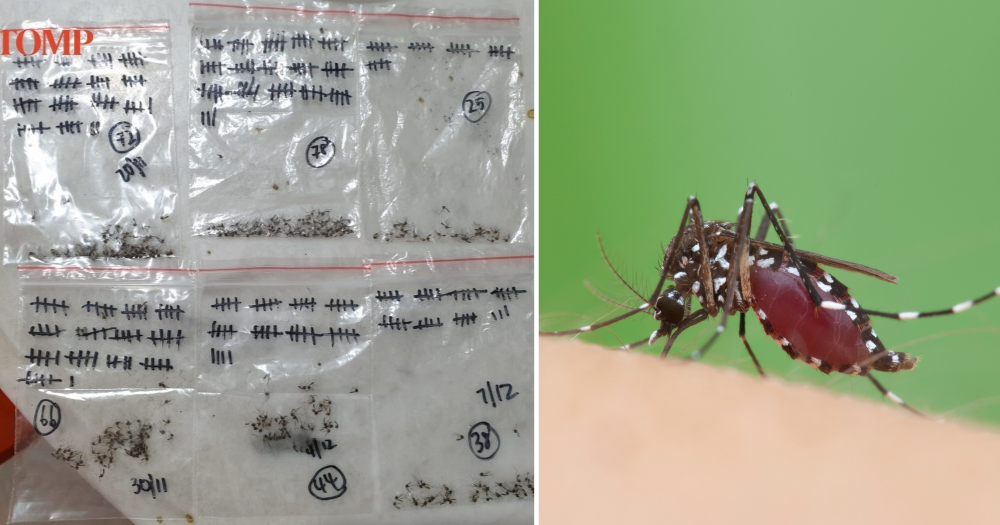You might have seen news of a Tampines resident at Blk 509 Tampines Central 1 exterminating 323 mosquitoes found in her house, in just one month.
The resident, Jen, documented the sheer quantity by storing and separating the carcasses in ziploc bags, each labelled with the total number killed in a week.
On the week of Nov. 20, Jen said she caught a "record number" of 103 mosquitoes.
She explained that the buzzing insects were affecting her "family's quality of life", and suspected that they were breeding in an "overgrown tree" outside her home.
Aedes mosquito population decreased since release of Wolbachia mosquitoes
In response to Mothership's queries, the National Environment Agency (NEA) has revealed that the large swarm of insects likely consist of male Wolbachia-infected mosquitoes.
These mosquitoes do not bite, and were released as part of the agency's efforts to curb the Aedes population in the area.
Male Wolbachia Aedes mosquitoes are sterile, and when released, will mate with female Aedes mosquitoes, resulting in unfertilised eggs.
According to NEA, the Wolbachia mosquitoes were first released in Tampines East Constituency in Feb. 2020.
Since then, there has been a general decrease in the population of Aedes mosquitoes in the constituency.
The average of between three to four female Aedes mosquitoes caught in every 10 Gravitraps per week, has declined to about one female Aedes mosquito, as of Nov. 2020.
For the precinct where Blk 509 is located, the Gravitrap surveillance system used to catch about four to five female Aedes mosquitoes in every 10 Gravitraps per week.
Since the release of male Wolbachia mosquitoes in May 2020, the number caught has halved to two to three female dengue mosquitoes per 10 Gravitraps per week.
However, there was still a small cluster of two dengue cases in the area recently.
To prevent further dengue outbreaks, NEA will continue releasing male Wolbachia mosquitoes in the area. The goal is to reach 90 per cent suppression of the Aedes mosquito population.
Will adjust distribution of Wolbachia mosquito release
NEA explained that the male mosquitoes sometimes swarm in one area, which was what Jen experienced.
The agency added that they have reached out to Jen.
NEA officers have also inspected her home and advised her to spray insecticide to kill any adult mosquitoes.
They added that they will work with Jen to obtain mosquito samples to further investigate the matter, and will continue to work closely with Tampines Town Council on the feedback about the tree in front of Jen's home.
"We understand the inconvenience experienced by some residents in Project Wolbachia areas," NEA said.
To minimise such occurrences of swarming, the distribution of the mosquito release will be adjusted.
NEA warned that residents may encounter more male Wolbachia mosquitoes on Monday and Friday mornings, which is when the mosquitoes are released.
In response to feedback on mosquito biting in the area, officers conducted two rounds of checks on Nov. 24 and Dec. 8.
Officers uncovered two mosquito breeding habitats in a gully trap and flower pot plate.
NEA said:
"NEA would like to remind residents that community vigilance and action remain critical in our fight against dengue, as the Aedes aegyptimosquitoes thrive in the urban environment and the majority of mosquito breeding habitats are still found in homes."
They urged residents to continue with the Mozzie Wipeout and to remove all sources of stagnant water.
Totally unrelated but follow and listen to our podcast here
Top photo from Stomp and Getty Images
If you like what you read, follow us on Facebook, Instagram, Twitter and Telegram to get the latest updates.
